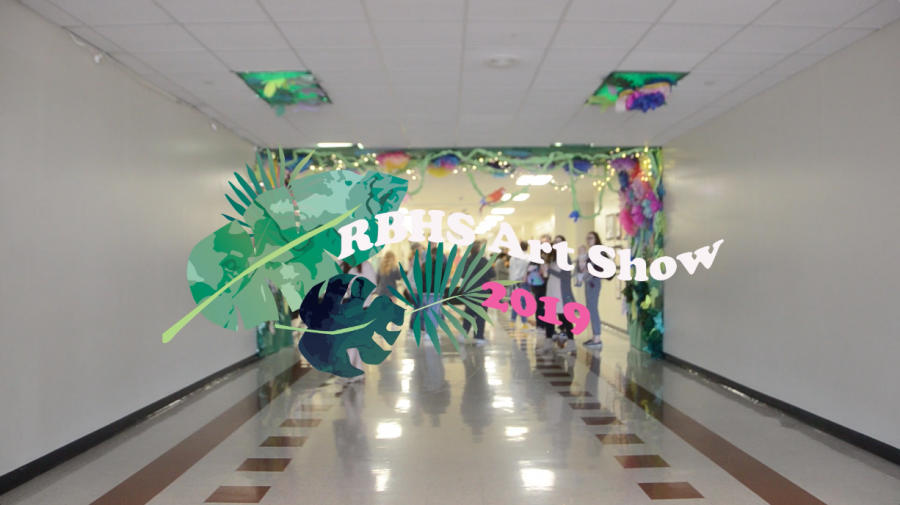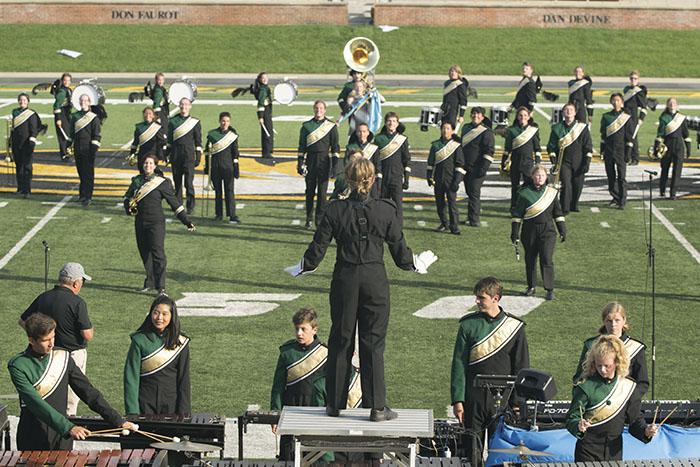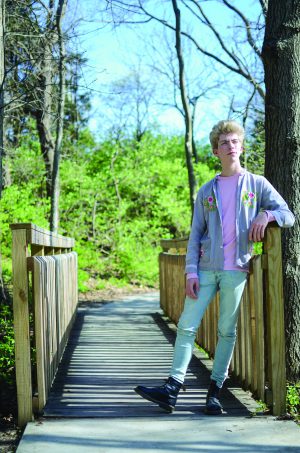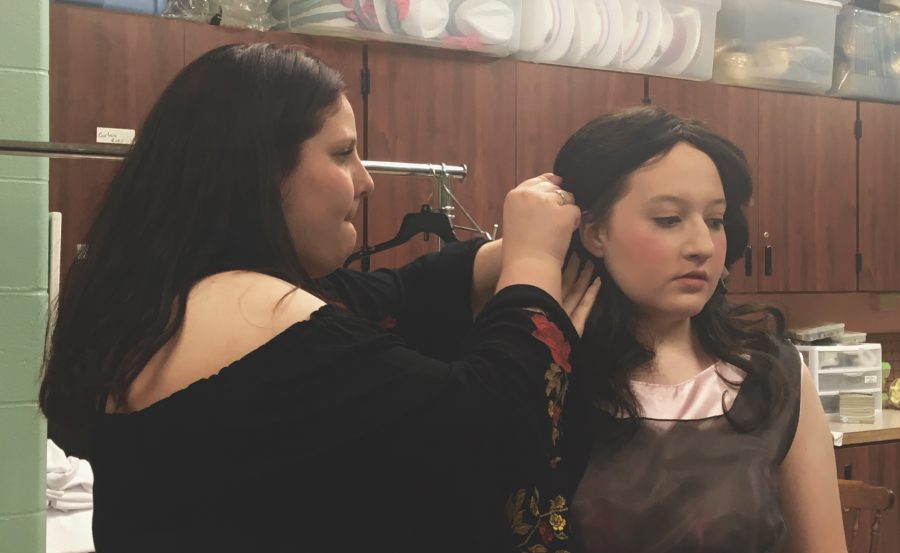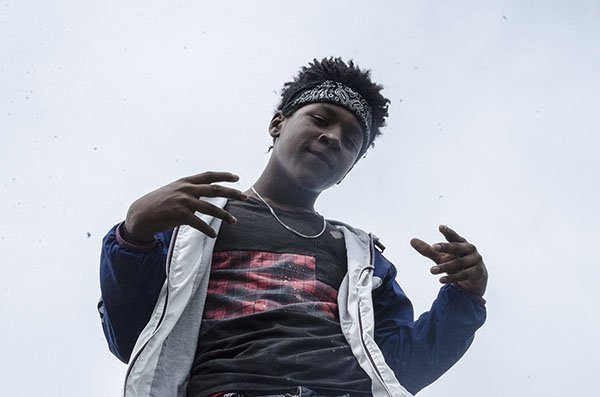
Behind the closed doors of room 408, a world is slowly and carefully coming to life. It’s the world of a little town, said to reside in the uppermost part of Maine—right where the Northern Lights paint the sky.
It’s the world of Almost, Maine, a place that never really got organized, so, as the playwright himself says, it’s just Almost.
A troupe of 19 actors and actresses from RBHS are becoming the relatable citizens of Almost. They fall in and out of love with one another in unusual ways, from casual bar conversations to conflicts at the ice skating rink. They give awkward hugs and even more awkward kisses. They portray one of the hardest aspects of human nature — love and the pain that often comes with it.
“Almost, Maine” consists of a series of vignettes, all happening at the same moment on one particularly fateful winter’s night. Rehearsals are practiced separately so that special attention is paid to each scene and its particular actors.
“Every scene has only two or three people, so rehearsals are not with the entire cast,” senior Alicia Gakima, who plays the role of tomboy Rhonda, said. “Instead, they’re with specific scenes, which makes it different from most plays. But, because of that, we get more rehearsal time to improve our characters. You get to know your partners well and work one-on-one with Director Mary Margaret Coffield.”
For many of the actors, the play has already exceeded their expectations. The script of “Almost, Maine” is intensely metaphorical and mature. It consists of everything from literal “bags of love” to passionate kisses in front of the curtains.
Everyone has “approached the play with a real focus and desire to make it as entertaining and meaningful as possible,” Gakima said.
Even when the lines run together and the actions are difficult to perfect, the cast finds ways to make every moment exciting.
Making her scene entertaining and true to character has been one of Gakima’s key challenges. The scene involves several strong kisses, and Gakima must try to convey the conversion from awkward tomboy to playful girlfriend.
“The scene that I’m doing in this play is definitely a lot crazier than some of the scenes I’ve done in the past, but I really don’t mind,” Gakima said. “We get some of the best responses when we perform because the scene is nothing that anyone would expect. And because of that, I always try to keep bringing more energy to the stage.”
This stress-free yet energetic atmosphere of the year’s winter play sparked back in the summer, when Coffield first started looking into John Cariani’s “Almost, Maine.” She doesn’t remember exactly how she stumbled upon the script but believes it “must have been magic.”
“Every summer I spend a lot of time trying to figure out what the winter play is going to be,” Coffield said. “And this past summer, I remember I was feeling frustrated because I wasn’t finding something that really tripped my trigger. I think I must have found ‘Almost, Maine’…and was intrigued by the thought that I could do this play with multiple kids. And the more I studied the play, the more I thought, ‘This is perfect.’ It was very serendipitous, really.”
Coffield took a leap of faith by hosting auditions for a play which, as she says, “only escapes corniness through the sensitivity of the actors.”
An unexpectedly large number of students showed up, eager to try their hand at the romantic scenes. Coffield says she “can’t remember a time with a play where it was more painful to cast.” Every actor brought something new, she said, but in the end, she felt she cast each role to it’s best fit.
Junior Sam Keller’s fit was country boy Randy. The new and unique role of “Almost, Maine,” being Keller’s second acting endeavor, brought on several challenges.
“The hardest part is not necessarily taking [the scene] seriously,” Keller said, “but there are some funny parts of the scene where it’s tough not to break character. When me and [junior Asa Lory] have to literally fall in the scene people start cracking up, and so it’s hard not to break character.”
And while staying in character was a difficult hump to overcome, Coffield has emphasized again and again how “the actors must play the roles with real depth,” almost like that of a film on the silver screen.
Breaking away from the typical, performance-based theater and moving toward a movie-style acting has meant all different kinds of adjustments and preparation for each and every actor.
“I’ve had to read the scene over a billion times,” Keller said, “and I’ve done character analysis with [junior Troy Guthrie] where we go through and think, OK, what would he be doing now? What would he be thinking there? And how would he say that? So that really helps me tap into the character, since I haven’t ever fallen in love with my best friend before.”
Molding this emotional reality was only one of the steps on the road to tomorrow, the opening night. The actors must also face technical difficulties: specialized music, lighting, set design, sound effects and costuming. Earlier this week, Coffield painted the PAC floors white, dotting them with cotton fluff, in order to produce the illusion of snow. Seniors Courtney Cooksey and Colleen Roetemeyer created a projection of lights and colors to depict the aurora borealis. All of this is in preparation for the laughs and cheers of a vibrant high school audience.
“The technical stuff for this show is really hard,” Coffield said, “because there are some unique lighting effects that have to be timed perfectly. And we’re trying to recreate some phenomena of nature, such as the Northern Lights, shooting stars, starry nights, snow, the sense of a place and external environment which is hard to create. And we have to do it in a way which is at least somewhat realistic because the acting style is very realistic and concrete.”
And while the acting and set design is sure to draw eyes and ears, Coffield says there’s an even further reason why students ought to attend the unusual magic which is “Almost, Maine.”
“I mean, don’t you think [the audience] is going to have fun?” Coffield said, laughing. “That’s the real reason to go. The audience is going to feel so happy. It’s a valentine after Valentine’s day.”
By Lauren Puckett













































































